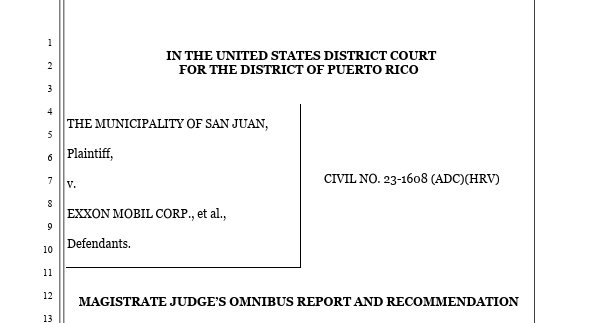Fossil Fuel Companies Must Face Claims by Puerto Rico's Capital City in Climate Lawsuit, Judge Says
A judge recommended that the fossil fuel industry face racketeering and antitrust claims brought by the Municipality of San Juan.

Hi, dear reader. Here's what's in this newsletter:
- A magistrate judge says that ExxonMobil, Chevron, Shell, and other fossil fuel majors must face the racketeering and antitrust claims presented in the Municipality of San Juan's climate lawsuit.
- A primer on the International Court of Justice's groundbreaking advisory opinion saying that countries must act on climate change and that those who fail to act could be held liable for compensation.
I originally broke the story about the magistrate judge's recommendation on San Juan's claims against Big Oil & Gas on my social media, but didn't have time to write it up until now. If you want to be alerted to breaking news as soon as it happens, follow me there: Bluesky & Instagram.
On Tuesday, a United States judge recommended ExxonMobil, Chevron, and other fossil fuel companies face claims brought by the Municipality of San Juan in Puerto Rico in a lawsuit that accuses the companies of colluding to mislead the public about the effects of climate change and suppress renewable energy.
Magistrate Judge Héctor Ramos Vega recommended San Juan be allowed to pursue racketeering and antitrust claims against the fossil fuel companies. However, he dismissed several state claims, like consumer fraud and deceptive business practices.
Now, a federal district court judge must choose whether to abide by Ramos Vega’s recommendations or only pick up a part of them.

San Juan’s lawsuit alleges the fossil fuel companies colluded to fund “climate change denial marketing campaigns” that mislead Puerto Ricans about the threat posed by climate change, how their products caused it, and the anticipated effects on Puerto Rico, according to the original federal complaint. The lawsuit also alleges that defendants “excluded other renewable players from entering the market" through these actions.
The lawsuit is seeking damages for the devastating effects of the 2017 hurricane season on Puerto Rico, whose intensity was increased by the defendants' contributions to climate change, according to the complaint.





